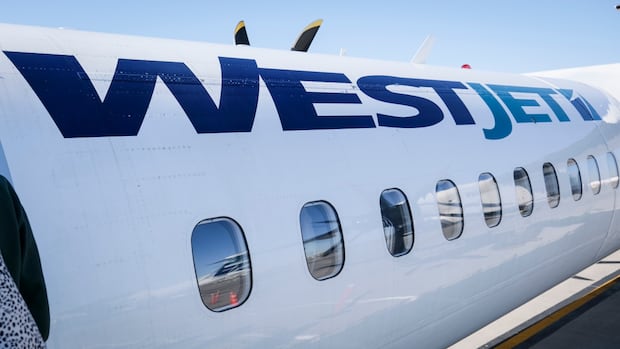WestJet has quietly hiked its first checked bag fee by $5 for ultra-basic and economy fares. It’s the airline’s second price hike for checked bags in less than two years and, if history repeats itself, Air Canada will soon follow suit.
For WestJet tickets purchased on or after Sept. 16, prepaid first checked bag fees now start at $40 for economy passengers. Those who wait until check-in to pay will be charged at least $60.
Passengers flying WestJet’s cheapest fare, ultra-basic, will shell out at least $50 to prepay for a checked bag for flights to most destinations.
The airline says WestJet Rewards members can bypass the fee increase if they prepay for bags, and passengers who pay for their flights with a WestJet RBC Mastercard can bypass the entire charge.
WestJet told CBC in an email that it upped the fee “to align with industry pricing and revenue trends.”
Air Canada’s first checked bag fee still starts at $35, but that could change.
In February 2024, WestJet introduced a previous $5 price hike for checked luggage. Air Canada did the same less than a month later.
Asked if the airline plans to follow WestJet’s lead again, Air Canada provided a vague response: “Our policy is to monitor the industry closely to remain competitive in every market we serve,” said spokesperson Peter Fitzpatrick in an email.
Several new charges
WestJet’s bag fee hike follows several new charges introduced by Canadian airlines, sparking concern from some consumer advocates that customers may not be able to properly comparison shop, and could wind up paying much higher fares than anticipated.
“It’s not consumer-friendly. It looks like it’s the Wild West,” said John Gradek, a faculty lecturer in supply networks and aviation management at Montreal’s McGill University.
According to Statistics Canada, airfares dropped 7.6 per cent in August, compared to one year ago.
Airlines say they “unbundle” fares so customers only have to pay for the extra services they want. But Gradek argues that airlines advertise low fares to hook in customers, who don’t realize — until they get the final bill — the true cost of their trip.
“The airlines are basically baiting you with this cheap airfare,” he said, adding that a family of four could end up paying hundreds of dollars extra in added fees.
A fee to recline your seat?
In 2024, discount carrier Flair airlines introduced a charge for passengers paying by credit card and WestJet ushered in a fee for customers who book their flights by phone. Also last year, WestJet and Air Canada stopped offering free carry-on bags for passengers who purchase its lowest basic fare.
WestJet then made headlines last month after revealing it was reconfiguring some of its aircraft to add “fixed recline” seats in the economy section that don’t move. Passengers who want to recline fully will have to pay for an upgrade.
WestJet spokesperson Josh Yeats said that many customers told the airline in feedback that they wanted a “fixed recline” seat to “preserve personal space.”
WestJet is reconfiguring the layout in many of its planes removing the option for many economy passengers to recline their seats. Instead, the airline will add a premium cabin section to some currently economy-only planes which will allow some seats to recline.
Airlines, which typically operate on razor-thin margins, are increasingly relying on extra fees as a revenue source. In 2024, total fees earned by 61 major airlines across the globe surpassed $148 billion US, a new record, according to IdeaWorksCompany, a U.S. research company that tracks airline revenue.
Gradek says Canadians should brace for more airline fees to come.
“The gap between the base fare and what you actually pay is going to get bigger,” he said. “Consumers are going to get more confused.”
To help people assess the true cost of airfares when shopping online, Gradek says carriers should display the total price with the most popular fees, such as baggage charges.
Currently, airlines must provide on their websites a breakdown of fees for optional services, but the charges don’t have to appear on the same page as advertised ticket prices.
Transport Canada told CBC News in an email that it’s “actively engaging with carriers to ensure maximum transparency of fees.”
Both WestJet and Air Canada said they are transparent with their customers about all fees and airfares.
“We are very clear at each stage how much these extra optional services cost, so people can knowingly choose to pay for them or not, and at what price,” said Air Canada spokesperson Fitzpatrick in an email.
What about more competition?
Consumer advocate Geoff White says another way to help passengers battling rising fees is to introduce more competition in the airline industry, which could help drive down overall fares.
Air Canada and WestJet typically adopt each other’s fees, and because they are the dominant carriers in Canada, passengers have limited options, said White.
“Consumers have no choice but to grin and bear it, and it’s unfortunate,” he said. “It’s the lack of competition that is the main barrier to better customer service and better pricing in Canada.”
A Competition Bureau study released in June called for changes to improve competition in the airline industry, including loosening rules that limit foreign ownership of Canadian airlines.
Innovation, Science and Economic Development Canada told CBC News that the government is reviewing the bureau’s recommendations.
The National Airlines Council of Canada, a lobby group representing both Air Canada and WestJet, has told CBC News that it does not believe increasing foreign investment or competition will address concerns around reducing the cost of travel.
WestJet has argued that the root cause of high airfares is not airline fees, but government and third-party charges passengers must pay, such as airport improvement fees and fuel taxes.








